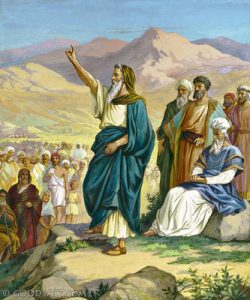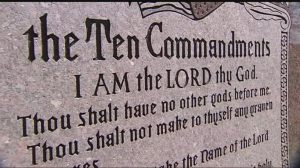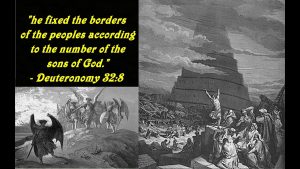
Shownotes
Wisdom-Trek / Creating a Legacy
Welcome to Day 1306 of our Wisdom-Trek, and thank you for joining me.
I am Guthrie Chamberlain, Your Guide to Wisdom
Mastering the Bible – One Long Sermon and Other Gods – Worldview Wednesday

Wisdom - the final frontier to true knowledge. Welcome to Wisdom-Trek where our mission is to create a legacy of wisdom, to seek out discernment and insights, and to boldly grow where few have chosen to grow before.
Hello, my friend, I am Guthrie Chamberlain, your captain on our journey to increase wisdom and create a living legacy. Thank you for joining us today as we explore wisdom on our 2nd millennium of podcasts. This is Day 1306 of our trek, and it is Worldview Wednesday. Creating a Biblical worldview is important to have a proper perspective on today’s current events.
To establish a Biblical worldview, you must also have a proper understanding of God and His Word. Our focus for the next several months on Worldview Wednesday is Mastering the Bible, through a series of brief insights. These insights are extracted from a book of the same title from one of today’s most prominent Hebrew Scholars, Dr. Micheal S. Heiser. This book is a collection of insights designed to help you understand the Bible better. When we let the Bible be what it is, we can understand it as the original readers did and as its writers intended. Each week we will explore two insights.
Mastering The Bible – One Long Sermon and Other Gods
Insight Thirty-One: Deuteronomy Is One Long Sermon by Moses to the Israelites

Like Leviticus and Numbers, Deuteronomy can be confusing since it seems like nothing is happening in Israel’s journey. It often seems like just a lot of talking. That’s because that’s what it is. Deuteronomy presents its content as a lengthy speech or sermon by Moses just before the Israelites try for the second time to enter the Promised Land. Deuteronomy, therefore, begins with the end of the forty-year wandering in the desert—a punishment imposed by God for their failure to enter the land in faith for fear of the giant Anakim in Numbers 13.
It’s because of this unfortunate history that the sermon of Moses starts out by rehearsing Israel’s history, warts and all, from its miraculous beginning with Abraham and Sarah to its miserable failure at Kadesh-Barnea (Deuteronomy 1). Once Israel gets that painful reminder, Deuteronomy repeats the laws given at Sinai, but with some changes that reflect life in the land (Deuteronomy 5-26). This is why this book is referred to in English Bibles as “Deuteronomy”—a title made up of two words that mean “second law'’ (deuteros + nomos). The effect of all this is that the words of Moses are taking the people spiritually and emotionally back to Sinai so they can start over again.
But Deuteronomy is far more than a repetition of a long list of laws. Part of Moses’ sermon is designed to elicit a public response from the people that this time —and for good—they will obey God in faith. Accordingly, chapters 27-30 are framed as a public covenant commitment ceremony to solidify that decision. It’s serious content, too, since two whole chapters (28-30) comprise a long list of curses that will happen to the people if they forsake the Lord as their God. Specifically, the promise of the land itself is tied to obedience to God found in Deuteronomy 28:15-21 and 36-37.
“But if you refuse to listen to the Lord your God and do not obey all the commands and decrees I am giving you today, all these curses will come and overwhelm you:
Your towns and your fields
will be cursed.
Your fruit baskets and breadboards
will be cursed.
Your children and your crops
will be cursed.
The offspring of your herds and flocks
will be cursed.
Wherever you go and whatever you do,
you will be cursed.
The Lord himself will send on you curses, confusion, and frustration in everything you do, until at last, you are completely destroyed for doing evil and abandoning me. The Lord will afflict you with diseases until none of you are left in the land you are about to enter and occupy…
The Lord will exile you and your king to a nation unknown to you and your ancestors. There in exile you will worship gods of wood and stone! You will become an object of horror, ridicule, and mockery among all the nations to which the Lord sends you."

Sadly, these last statements reflect what eventually came to pass when Israel was exiled from the land. Deuteronomy is a powerful book. We need to heed it more carefully than Israel did.
Insight Thirty-Two: Ancient Israelites Believed the Gods of the Nations Were Real

Dr. Heiser has brought up Deuteronomy 32 a couple of times already. Part of that important Old Testament chapter refers back to the Tower of Babel incident where the earth was divided into the nations listed in Genesis 10. Deuteronomy 32:8 (also when compared to Deuteronomy 4:19-20) tells us that God allotted the nations among the sons of God when he decided to punish the rebellion at Babel and divide the earth. Israel would thereafter be the Lord’s portion on earth (Deuteronomy 32:9). Deuteronomy 4:19-20, a parallel passage, tells us these sons of God were the “forces in heaven,” a term also used in 1 Kings 22:19. In Kings, the “armies of heaven” are the spiritual beings assembled before God who help decide wicked King Ahab’s fate.
We also saw earlier how this incident, as described in Deuteronomy 32:8-9, led to a cosmic-geographical worldview, where Israel was holy ground and all the other nations were under the dominion of hostile gods. The story of the Old Testament is basically Israel and its God against the nations and their little “g” gods. For ancient Israelites, these sons of God who presided over other nations were real entities. Spiritual warfare was the Israelites’ daily reality.
Another verse in Deuteronomy 32 drives home this point. Just after discussing how God divided up the nations and allotted them to lesser gods, Deuteronomy 32:15-17 has this sad refrain:
“But Israel soon became fat and unruly;
the people grew heavy, plump, and stuffed!
Then they abandoned the God who had made them;
they made light of the Rock of their salvation.
They stirred up his jealousy by worshiping foreign gods;
they provoked his fury with detestable deeds.
They offered sacrifices to demons, which are not God,
to gods they had not known before,
to new gods only recently arrived,
to gods their ancestors had never feared."
Verse 17 tells us that, despite repeated warnings (Deuteronomy 17:1-3; 29:24-26), Israel turned to idolatry. Israelites worshipped the gods of other nations. Notice that these entities are referred to as demons. The gods of the other nations are not mere idols; they are real spiritual entities hostile to God and his people.
Interestingly, Paul quotes Deuteronomy 32:17 in his discussion of eating food offered to idols in 1 Corinthians 10:19-22. But Paul doesn’t use only the word idols in his warning. He explains that there are spiritual entities behind and beyond idols—demons (1 Corinthians 10:20-22). Biblical people believed in unseen spiritual conflict. It was real to them. Is it real to you?
That will conclude this week’s lesson on another two insights from Dr. Heiser’s book Mastering The Bible. Next Worldview Wednesday, we will continue with two additional insights. I believe you will find each Worldview Wednesday an interesting topic to consider as we build our Biblical worldview.
Tomorrow we will continue with our 3-minute humor nugget that will provide you with a bit of cheer and help you to lighten up and live a rich and satisfying life. So encourage your friends and family to join us and then come along with us tomorrow for another day of our Wisdom-Trek, Creating a Legacy.

If you would like to listen to any of our past 1305 treks or read the Wisdom Journal, they are available at Wisdom-Trek.com. I encourage you to subscribe to Wisdom-Trek on your favorite podcast player so that each day’s trek will be downloaded automatically.
Thank you for allowing me to be your guide, mentor, and most importantly, your friend as I serve you through this Wisdom-Trek podcast and journal.
As we take this trek together, let us always:
- Live Abundantly (Fully)
- Love Unconditionally
- Listen Intentionally
- Learn Continuously
- Lend to others Generously
- Lead with Integrity
- Leave a Living Legacy Each Day
I am Guthrie Chamberlain reminding you to Keep Moving Forward, Enjoy Your Journey, and Create a Great Day Everyday! See you tomorrow!